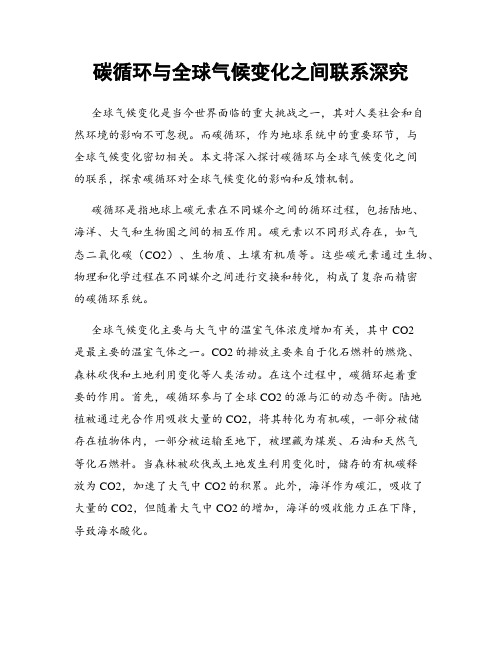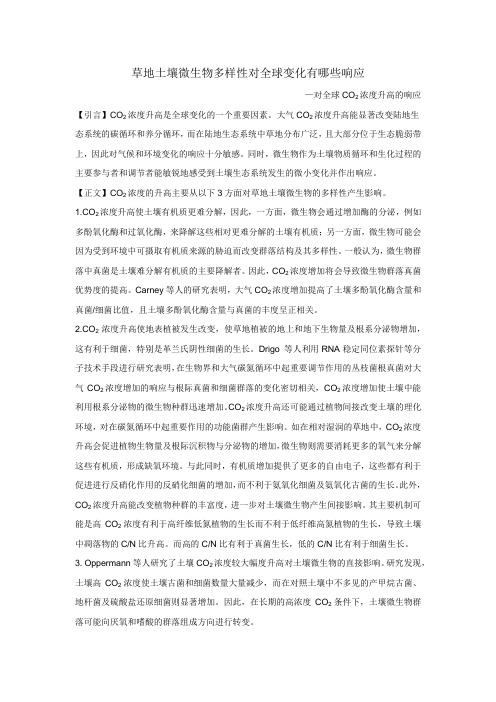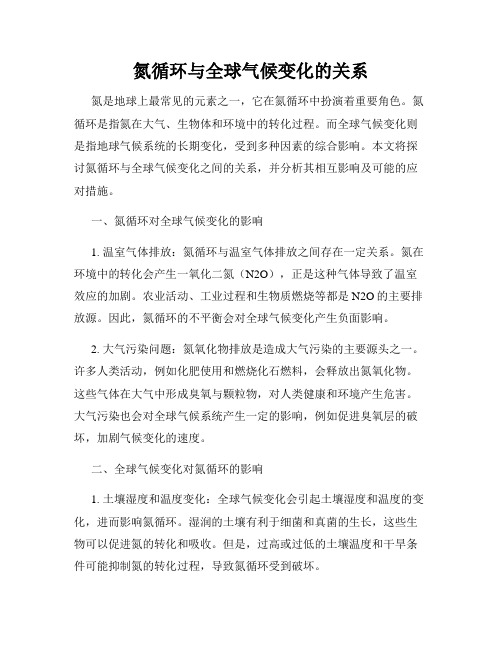微生物介导的碳氮循环过程对全球气候变化的响应
生态系统碳循环及其对全球气候变化的响应

生态系统碳循环及其对全球气候变化的响应在全球气候变化的背景下,碳循环成为了越来越受关注的话题。
生态系统作为地球上的基本单位,也与碳循环密不可分。
生态系统碳循环是指生态系统中碳元素从一个年度循环到另一个年度的过程。
这一过程不仅影响了生态系统本身的健康稳定,还对全球气候变化产生了重要的影响。
一、生态系统碳循环的原理生态系统主要包括植被、土壤、水体和大气等四个组成部分。
植物通过光合作用吸收二氧化碳,将其转化为有机物质,并释放出氧气。
在植物的凋落、死亡或消化下,植物的有机物质被分解和呼吸,并释放出二氧化碳。
如此往复,形成了生态系统中碳元素的循环。
在这一过程中,土壤是一个重要的储存碳的过程。
土壤中的有机质和微生物可以长期储存大量的碳元素。
同时,生态系统中大气的作用不可忽视。
大气中的二氧化碳不断地通过气流进入或离开生态系统,影响着生态系统中碳的循环和储存。
二、全球气候变化对生态系统碳循环的影响全球气候变化对生态系统碳循环产生了复杂的影响。
一方面,气温的变化对生态系统中植被的生长和呼吸有直接影响。
气温升高加速了植物生长的速度,也使植物的呼吸加快。
因此,在气温升高的情况下,生态系统中碳的循环速度也会加快。
另一方面,全球气候变化对大气和土壤中碳的循环和储存都有影响。
在全球变暖的情况下,海水温度升高会使海洋中的二氧化碳逸出,进入大气中;同时,森林大火、土地利用变化等因素也会导致土壤中的碳被释放出来。
这些因素都对全球气候变化的形成起着重要作用。
三、生态系统碳循环的调控措施为了应对气候变化,需要采取全球性的措施来减缓碳排放、降低碳浓度,尽可能地减少生态系统对气候变化的响应和影响。
同时,通过科学合理的管理方式和技术手段,对生态系统中碳的循环进行有效的控制和调控,也是十分必要的。
例如,在农业领域,广泛推行有机耕作和植树造林等措施,可以有效地增加土壤中的有机质含量,达到增加碳的储存和减少碳排放的效果。
同时,通过生态公益林的建设和生态补偿机制的实施,也可以有效地促进生态系统中碳的循环和生态系统的修复。
氮循环影响了全球气候变化

氮循环影响了全球气候变化氮循环是全球生态系统中一个至关重要的循环过程,它在很大程度上影响着全球气候变化。
该循环包括了氮气在大气中的摄取、固定、转化和释放等一系列过程。
通过这些过程,氮循环对温室气体的排放、土壤肥力和生物多样性等方面产生重要的影响,进而对全球气候变化产生深远的影响。
首先,氮循环与温室气体排放密切相关。
氮气在大气中占据了主要的组分之一,它的浓度高达78%,排名第一。
然而,在现代工业化社会,人类活动导致大量氮气的排放,如燃烧化石燃料、工业生产和农业施肥等。
这些活动不仅导致氮气的排放增加,还会间接地导致一氧化氮和氮氧化物等温室气体的释放,从而加剧了全球气候变化。
这些温室气体会在大气中形成保温效应,使地球表面温度上升,进而引发一系列不利的气候现象,如全球变暖、气候异常和极端天气事件的增加等。
其次,氮循环对土壤肥力产生重要影响。
氮元素是植物生长的关键要素之一,它参与了蛋白质、核酸、氨基酸等重要有机物的合成过程。
在自然生态系统中,氮循环通过固定空气中的氮气并将其转化成可被植物吸收利用的氮态形式,进而提供了植物所需的养分。
然而,在现代农业实践中,过度的化肥使用和养殖业的废弃物处理等导致了氮循环的紊乱。
大量的氮素被输入土壤,超过了土壤的吸收和利用能力。
过剩的氮素会被流失到河流、湖泊和海洋中,形成富营养化,导致水体生态系统的破坏。
同时,过剩的氮素还会诱发土壤酸化和土壤盐碱化等问题,削弱土壤肥力,导致农作物产量的下降。
这种土壤肥力的下降会进一步导致农业生产的不稳定,从而对全球食品供应造成影响,并对整个生态系统的可持续发展产生负面影响。
此外,氮循环还对生物多样性产生着重要影响。
氮素是植物生长所需的重要元素之一,植物的生长和繁殖与氮素的供应密切相关。
然而,过度的氮素输入会改变土壤中的氮素浓度,从而干扰了植物群落的平衡。
一些有竞争优势的植物对氮素利用更高效,会在竞争中获得优势地位,导致其他植物的生长受到抑制,进而引起植物物种多样性的下降。
生物化学循环及其对全球气候的影响

生物化学循环及其对全球气候的影响随着全球气候变化的日益严重化,针对气候变化的各种议题被广泛关注。
其中,生物化学循环是影响气候变化的重要因素之一。
生物化学循环包括碳循环、氮循环、硫循环等,它们会产生各种影响,以下将具体分析。
碳循环碳循环是指碳在大气、陆地和海洋之间的循环。
碳在大气中以二氧化碳(CO2)的形式存在,然后被植物通过光合作用吸收,将其转换为有机物,并释放氧气(O2)。
随后,这些有机物被食物链传播,最终进入动物体内。
接着,当植物和动物死亡后,它们的遗体和排泄物会被分解,将其转换回二氧化碳,形成循环。
碳循环对全球气候的影响体现在以下方面:首先,碳循环直接关系到温室效应。
二氧化碳是主要温室气体(GHG)之一,它能够吸收太阳热辐射,在地球表面产生温暖效应。
然而,由于人类活动的增长,二氧化碳的排放不断增加,导致气温上升,全球气候变得不稳定。
其次,碳循环也对海洋生态系统的健康产生了影响。
二氧化碳溶解在海水中形成碳酸,并导致了海洋的酸化。
水体酸化会导致海洋生态系统中壳类动物无法正常生长并死亡,进而影响整个海洋食物链。
氮循环氮循环是指氮在大气、土壤、植物和动物之间的循环。
氮气(N2)占大气的78%,而氮在大气中并不直接有用,它需要被植物吸收。
当植物从土壤中吸收氮时,氮原子被转化成氨,称为氮固定。
在这里,大部分氮由微生物完成。
植物吸收到氮后,将其转化成蛋白质。
当动物摄取植物,摄取蛋白质后,氮元素就进入了动物体内。
当动物死亡时,氮又通过分解和腐烂返回到土壤。
氮循环对全球气候的影响体现在以下方面:首先,氮循环对土地健康的影响非常大。
使用过量化肥会导致土壤贫瘠,而这又会导致采取更多的措施来恢复土壤健康,例如破坏地下水系统或往土地注入过多的氮肥等。
其次,氮的排放对空气质量也是一种污染。
汽车和工业设施的废气中含有氮氧化物(NOx),而这些气体产生的氮氧化物在空气中有毒,会导致酸雨和这样的其他恶性后果。
硫循环硫循环是硫在大气、海洋和陆地之间的循环。
土壤碳氮循环与全球变化

土壤碳氮循环与全球变化
气中的温室气体浓度在不断升高,近年来增加速度加快,预计2030年CO2浓度将加倍,这将引起全球气候变化,即地球表面温度升高,全球平均降水增加,但变化幅度区域差异显著。
气候变化对土壤系统产生重要影响,土壤碳库和碳流将发生显著变化;土壤释放CO2和CH4的量明显增加,有机质分解加快;土壤N流失加快;土壤生物多样性会受影响。
氮循环是指氮在自然界中的循环转化过程,是生物圈内基本的物质循环之一,如大气中的氮经微生物等作用而进入土壤,为动植物所利用,最终又在微生物的参与下返回大气中,如此反复循环,以至无穷。
由人类活动引起的温室效应以及由此造成的气候变暖对森林生态系统的影响已引起人们的普遍关注.森林土壤碳循环作为全球碳循环的重要组成部分,是决定未来陆地生物圈表现为碳源/碳汇的关键环节,揭示这一作用对于准确理解全球变化背景下陆地生态系统碳循环过程具有重要的指导意义.本文主要通过论述影响土壤碳循环过程的5个方面(土壤呼吸、土壤微生物、土壤酶活性、凋落物输入与分解、土壤碳库),综述了近10a来全球气候变暖对土壤碳循环过程的影响.近年来,尽管已开展了大量有关土壤碳循环对气候变暖的响应及反馈机制的研究,并取得了一定的成果,但研究结果仍然存在很大的不确定性.整合各种密切关联的全球变化现象,完善研究方法和实验手段,加强根际微生态系统碳循环过程与机理研究将是下一步研究的方向和重点。
碳循环与全球气候变化之间联系深究

碳循环与全球气候变化之间联系深究全球气候变化是当今世界面临的重大挑战之一,其对人类社会和自然环境的影响不可忽视。
而碳循环,作为地球系统中的重要环节,与全球气候变化密切相关。
本文将深入探讨碳循环与全球气候变化之间的联系,探索碳循环对全球气候变化的影响和反馈机制。
碳循环是指地球上碳元素在不同媒介之间的循环过程,包括陆地、海洋、大气和生物圈之间的相互作用。
碳元素以不同形式存在,如气态二氧化碳(CO2)、生物质、土壤有机质等。
这些碳元素通过生物、物理和化学过程在不同媒介之间进行交换和转化,构成了复杂而精密的碳循环系统。
全球气候变化主要与大气中的温室气体浓度增加有关,其中CO2是最主要的温室气体之一。
CO2的排放主要来自于化石燃料的燃烧、森林砍伐和土地利用变化等人类活动。
在这个过程中,碳循环起着重要的作用。
首先,碳循环参与了全球CO2的源与汇的动态平衡。
陆地植被通过光合作用吸收大量的CO2,将其转化为有机碳,一部分被储存在植物体内,一部分被运输至地下,被埋藏为煤炭、石油和天然气等化石燃料。
当森林被砍伐或土地发生利用变化时,储存的有机碳释放为CO2,加速了大气中CO2的积累。
此外,海洋作为碳汇,吸收了大量的CO2,但随着大气中CO2的增加,海洋的吸收能力正在下降,导致海水酸化。
其次,碳循环影响着气候系统的能量平衡。
大气中的CO2和其他温室气体可以吸收地球辐射的一部分,并将其重新辐射回地球表面,使得地球的温度上升,形成温室效应。
在这个过程中,碳循环的影响体现在陆地和海洋的表面反射和吸收辐射能力上。
森林覆盖的减少和冰雪消融导致地球表面的反射能力下降,从而进一步加剧了温室效应。
此外,碳循环还参与了气候系统中的正反馈循环,进一步影响全球气候变化的速率和程度。
正反馈循环是指系统变化引起的影响进一步加剧原系统变化的过程。
在全球气候变化中,温度的升高导致冰雪融化和海洋酸化,进而加速地球表面的升温,形成正反馈循环。
碳循环在这个过程中又起到了重要作用。
微生物生态学与全球气候变化之间的相互作用研究论文素材

微生物生态学与全球气候变化之间的相互作用研究论文素材在如今全球气候变化日益严重的背景下,微生物生态学在研究气候变化方面扮演着重要的角色。
微生物是地球上数量最为庞大的生物群体,它们存在于各种环境中,包括水体、土壤、大气等等。
微生物的活动与全球气候变化之间存在着密切的相互作用,下面将列举几个相关的研究论文素材以支持这一观点。
1. "Microbial mediation of carbon-cycle feedbacks to climate warming" (微生物介导的碳循环反馈与气候变暖)这篇论文综述了微生物在全球碳循环中的关键作用,以及其与气候变化之间的相互作用。
研究发现,微生物通过参与有机物的分解和合成过程,对全球碳循环中的碳通量起到重要调控作用。
气候变暖会显著影响微生物群落的组成和功能,进而改变碳循环的速率和方向。
因此,微生物生态学研究在预测全球气候变化对碳循环的影响方面具有重要意义。
2. "Microbial responses to climate change: from ecosystems to molecules" (微生物对气候变化的响应:从生态系统到分子层面)这篇综述性论文探讨了微生物对气候变化的响应机制。
研究表明,气候变化会引起环境条件的改变,从而影响微生物的群落结构、生产力和功能。
同时,微生物为适应新的环境条件,可能会发生基因型和表型的变化。
通过深入研究微生物的响应机制,可以更好地理解气候变化对生态系统的影响。
3. "The role of microorganisms in global nitrogen cycling" (微生物在全球氮循环中的作用)这篇综述性论文阐述了微生物在全球氮循环中的重要作用。
氮是生物体重要的营养元素,微生物通过固氮和解氮的过程参与着全球氮循环。
气候变化对氮循环的影响可能会改变微生物参与氮转化的速率和效率,从而进一步影响生态系统的氮循环过程。
草地土壤微生物多样性对全球变化有哪些响应

草地土壤微生物多样性对全球变化有哪些响应—对全球CO2浓度升高的响应【引言】CO2浓度升高是全球变化的一个重要因素。
大气CO2浓度升高能显著改变陆地生态系统的碳循环和养分循环,而在陆地生态系统中草地分布广泛,且大部分位于生态脆弱带上,因此对气候和环境变化的响应十分敏感。
同时,微生物作为土壤物质循环和生化过程的主要参与者和调节者能敏锐地感受到土壤生态系统发生的微小变化并作出响应。
【正文】CO2浓度的升高主要从以下3方面对草地土壤微生物的多样性产生影响。
1.CO2浓度升高使土壤有机质更难分解,因此,一方面,微生物会通过增加酶的分泌,例如多酚氧化酶和过氧化酶,来降解这些相对更难分解的土壤有机质;另一方面,微生物可能会因为受到环境中可摄取有机质来源的胁迫而改变群落结构及其多样性。
一般认为,微生物群落中真菌是土壤难分解有机质的主要降解者。
因此,CO2浓度增加将会导致微生物群落真菌优势度的提高。
Carney等人的研究表明,大气CO2浓度增加提高了土壤多酚氧化酶含量和真菌/细菌比值,且土壤多酚氧化酶含量与真菌的丰度呈正相关。
2.CO2浓度升高使地表植被发生改变,使草地植被的地上和地下生物量及根系分泌物增加,这有利于细菌,特别是革兰氏阴性细菌的生长。
Drigo 等人利用RNA稳定同位素探针等分子技术手段进行研究表明,在生物界和大气碳氮循环中起重要调节作用的丛枝菌根真菌对大气CO2浓度增加的响应与根际真菌和细菌群落的变化密切相关,CO2浓度增加使土壤中能利用根系分泌物的微生物种群迅速增加。
CO2浓度升高还可能通过植物间接改变土壤的理化环境,对在碳氮循环中起重要作用的功能菌群产生影响。
如在相对湿润的草地中,CO2浓度升高会促进植物生物量及根际沉积物与分泌物的增加,微生物则需要消耗更多的氧气来分解这些有机质,形成缺氧环境。
与此同时,有机质增加提供了更多的自由电子,这些都有利于促进进行反硝化作用的反硝化细菌的增加,而不利于氨氧化细菌及氨氧化古菌的生长。
氮循环与全球气候变化的关系

氮循环与全球气候变化的关系氮是地球上最常见的元素之一,它在氮循环中扮演着重要角色。
氮循环是指氮在大气、生物体和环境中的转化过程。
而全球气候变化则是指地球气候系统的长期变化,受到多种因素的综合影响。
本文将探讨氮循环与全球气候变化之间的关系,并分析其相互影响及可能的应对措施。
一、氮循环对全球气候变化的影响1. 温室气体排放:氮循环与温室气体排放之间存在一定关系。
氮在环境中的转化会产生一氧化二氮(N2O),正是这种气体导致了温室效应的加剧。
农业活动、工业过程和生物质燃烧等都是N2O的主要排放源。
因此,氮循环的不平衡会对全球气候变化产生负面影响。
2. 大气污染问题:氮氧化物排放是造成大气污染的主要源头之一。
许多人类活动,例如化肥使用和燃烧化石燃料,会释放出氮氧化物。
这些气体在大气中形成臭氧与颗粒物,对人类健康和环境产生危害。
大气污染也会对全球气候系统产生一定的影响,例如促进臭氧层的破坏,加剧气候变化的速度。
二、全球气候变化对氮循环的影响1. 土壤湿度和温度变化:全球气候变化会引起土壤湿度和温度的变化,进而影响氮循环。
湿润的土壤有利于细菌和真菌的生长,这些生物可以促进氮的转化和吸收。
但是,过高或过低的土壤温度和干旱条件可能抑制氮的转化过程,导致氮循环受到破坏。
2. 海洋酸化:全球气候变化导致海洋温度上升和二氧化碳浓度增加,进而引起海洋酸化。
而海洋是全球氮循环的主要储存汇,海水酸化会对海洋生态系统的氮循环造成重大影响。
海洋酸化可能导致浮游植物和珊瑚藻等生物受损,减少海洋中氮的吸收和释放,从而干扰全球氮循环的平衡。
三、应对氮循环与全球气候变化的措施1. 减少温室气体排放:为减少氮循环对温室气体排放的负面影响,可以采取措施降低农业和工业过程中的N2O排放。
例如,优化农业管理措施,合理使用化肥以减少氮肥的使用量;提高能源利用效率,减少化石燃料的燃烧等。
2. 推动可持续农业发展:实施可持续农业管理措施,如合理轮作、农田水管理和有机农业。
微生物群落和环境变化的生态功能和响应机制

微生物群落和环境变化的生态功能和响应机制随着环境变化越来越明显,科学家对微生物群落的研究也越来越关注。
微生物群落是生态系统中一种复杂而不可或缺的组成部分,它对环境变化具有非常重要的生态功能和响应机制。
一、微生物群落的生态功能微生物群落在生态系统中扮演着非常重要的角色。
首先,它们参与了三大生态循环:碳循环、氮循环和磷循环。
其中,碳循环是指微生物群落通过代谢作用将有机物转化为CO2,同时通过光合作用将CO2转化为有机物。
氮循环是指微生物群落通过对NH3、NO2-、NO3-的还原和氧化,来促进氮的转化。
磷循环则是指微生物群落通过分解有机磷,来促进无机磷的转化。
其次,微生物群落能够影响植被类型和产生生物多样性。
它们通过分解有机物,释放出营养物质,促进了植被的生长。
同时,不同类型的微生物群落在不同的环境中具有不同的优势,这也促进了生物的多样性。
第三,微生物群落还能够抵御外来物种,并维持生态系统的平衡。
它们通过利用共生作用,来抑制外来物种的生长,同时促进本地生态系统的发展。
二、微生物群落对环境变化的响应机制微生物群落的响应机制非常复杂,其中包括了多种适应和抗逆机制。
这些机制能够帮助微生物群落更好地适应不同环境下的变化。
首先,微生物群落通过调整代谢途径来适应环境变化。
例如,当环境中氧气含量降低时,微生物群落会通过调整代谢途径来适应寡氧环境。
其次,微生物群落还能够通过增加细胞膜的流动性来提高其对环境变化的适应性。
细胞膜流动性的提高可以使微生物群落更好地适应高盐、低温等环境。
最后,微生物群落还通过增加菌体大小来提高抗逆性。
大菌体的细胞质量量更大,能够在环境变化时更好地维持能量代谢的平衡。
三、微生物群落和环境变化对生态系统的影响微生物群落对生态系统稳定具有非常重要的影响。
环境变化会使得微生物群落的种类、数量和功能发生变化,从而影响生态系统的生态过程和稳定性。
例如,全球变暖会导致温度的升高,从而影响微生物群落的活动,进而影响生态系统的稳定性。
微生物对气候变化的响应与适应机制研究

微生物对气候变化的响应与适应机制研究近年来,随着全球气候变化的迅速加剧,微生物在调节和响应气候变化方面的作用备受关注。
微生物是地球上最早出现的生命形式之一,其数量庞大,种类繁多,分布广泛。
微生物对气候变化的响应具有重要意义,能够为我们理解和应对气候变化提供宝贵的信息。
首先,微生物对气候变化的响应主要体现在生理和生态方面。
在温度变化方面,研究发现,温度的升高会促进微生物的生长和代谢速度。
一些微生物会通过改变细胞膜的组成,以适应高温环境。
另外,微生物在寒冷环境中也能够存活下来,一些偏爱低温环境的微生物甚至能够在冰川和冻土中生存。
此外,微生物对降水的变化也有一定的适应能力。
例如,干旱条件下,一些微生物会形成孢子或耐性细胞,以在干旱期存活下来。
其次,微生物对气候变化的适应机制主要包括遗传和进化调节。
微生物通过遗传变异和进化选择,使得其能够在不同的环境中适应生存。
例如,一些细菌能够通过产生耐热酶来适应高温环境,而其他微生物则通过改变细胞膜脂肪酸的结构来适应低温环境。
此外,微生物还能够通过调控基因表达来适应气候变化。
例如,在干旱条件下,一些微生物会调节特定基因的表达,以增强抵抗干旱的能力。
与此同时,微生物对气候变化的响应还涉及到与其他生物之间的相互作用。
微生物与植物、动物以及其他微生物之间存在着复杂的相互关系,这些相互作用在调节气候变化过程中起着重要作用。
例如,一些微生物能够与植物共生,促进植物的生长,从而增加碳的固定和氧的释放。
此外,微生物还可以分解植物和动物的有机物,参与碳循环和氮循环等关键过程,从而影响气候系统的稳定性。
在研究微生物对气候变化的响应和适应机制时,需要结合实验室研究和野外观测相结合,深入探索微生物与气候变化之间的关系。
目前,随着分子生物学和生物信息学等技术的发展,我们能够更好地理解微生物的多样性和功能特征,有助于揭示微生物对气候变化的响应机制。
此外,还需要加强全球范围内的微生物监测和数据库建设,以积累更多关于微生物对气候变化响应的数据,并为气候变化预测和应对提供科学依据。
微生物对土壤碳循环和温室气体排放的影响研究

微生物对土壤碳循环和温室气体排放的影响研究碳循环是指地球上碳元素在大气、水体和陆地之间的不断转移和交换过程。
它对维持地球生态系统的平衡和稳定起着至关重要的作用。
而温室气体排放则是指人类活动导致的二氧化碳、甲烷、氧化亚氮等气体的释放,进而导致全球气候变化。
微生物作为土壤中极为重要的组成部分,对土壤碳循环和温室气体排放具有重要的影响。
本文将重点探讨微生物对土壤碳循环和温室气体排放的影响,并分析其研究意义和前景。
一、微生物促进土壤碳循环微生物通过多种途径促进土壤碳循环,主要包括有机质分解、土壤有机碳的形成与稳定、土壤酶活性的调节等。
1. 有机质分解土壤中的微生物通过分解有机废弃物和植物残体,将有机质转化为可被植物直接吸收的无机养分。
这一过程被称为有机质分解,是土壤碳循环的重要环节。
微生物通过分泌酶类降解有机物,释放出二氧化碳和水,从而促进碳与氧的循环。
此外,微生物还能分解有机物中的氮、磷等元素,提供给植物吸收利用,促进植物生长,进而影响土壤碳循环。
2. 土壤有机碳的形成与稳定土壤微生物通过吸收、固定和贮存碳元素,直接参与有机碳的形成与稳定。
当植物通过光合作用吸收二氧化碳时,一部分碳被转化为有机物质,并经过植物根系释放到土壤中。
微生物会将这些有机物质分解并转化为自己的生物质,并进一步形成稳定的土壤有机碳。
这种过程被称为土壤碳固定,对于促进土壤碳循环起到重要作用。
3. 土壤酶活性的调节微生物在土壤中产生多种酶类,通过对有机物质的降解和转化,调节土壤中的酶活性。
酶类对土壤中碳的降解和转化起到催化作用,能够加速有机物质的分解速率,影响土壤碳的流动和循环过程。
微生物的酶活性还受到环境因素的影响,如土壤温度、湿度、氧气含量等。
因此,微生物通过调节土壤酶活性,对土壤碳循环起到重要影响。
二、微生物对温室气体排放的影响微生物通过多种方式影响土壤中温室气体的排放,主要包括甲烷的产生与消耗、氧化亚氮的生成与损失等。
1. 甲烷的产生与消耗甲烷是一种重要的温室气体,其在土壤中的排放与微生物活动密切相关。
微生物对全球气候变化的响应与调控机制

微生物对全球气候变化的响应与调控机制全球气候变化是当今世界面临的一个重大挑战,其中微生物在全球气候变化的过程中发挥着越来越重要的作用。
微生物对全球气候变化的响应和调控机制成为了科学研究的热点之一。
一、微生物对全球气候变化的响应1. 温度变化的影响随着气温的升高,微生物群落也会发生变化。
对海洋微生物而言,温度上升可能会导致大型微生物数量的增加以及对功能多样性的影响。
对土壤微生物而言,过高或过低的温度都可能导致大量微生物死亡,从而影响生态系统的稳定性和功能。
2. 干旱和降雨变化的影响干旱和降雨变化也会影响微生物的分布和活动。
在干旱环境中,微生物的生长速度会减缓,从而影响了微生物对土壤中有机质和营养物质的消耗情况。
当降雨过多时,水排干地原本生长的微生物会因为水的排放而遭到损失,但适当的降雨又有助于微生物的生存和繁殖。
3. 气候变化影响微生物群落的分布和数量全球气候变化对微生物群落的分布和数量都产生着极大的影响。
一些常见的微生物,如微藻和浮游生物等,在海洋中的数量也会随着气温的升高而增加。
低pH 和高CO2浓度等环境因素也可能影响微生物群落的分布和数量。
二、微生物的调控机制1. 微生物群落的物种多样性微生物群落的物种多样性是微生物在调节生态系统稳定性中发挥重要作用的原因之一。
一个具有多样性的微生物群落可以更好地适应不同的环境条件,从而更好地保持生态系统的稳定性。
2. 微生物的生态位分化微生物的生态位分化也是微生物在维持生态系统平衡中的重要作用。
因为每种微生物都会在生态系统中占据自己独特的生态位,因此这些微生物能够在整个系统中发挥其特定的生态功能。
3. 微生物群落的相互作用微生物群落的相互作用也是微生物在维持生态系统平衡中发挥重要作用的原因。
微生物相互作用的形式非常多样,如共生、拮抗和竞争等,这些都有助于维持生态系统的平衡和稳定性。
三、微生物对应对气候变化的影响和展望微生物对全球气候变化的响应和调控机制是科学研究的一个重要方向。
微生物与气候变化的关系

微生物与气候变化的关系气候变化是当前世界面临的重大挑战之一,对全球生态系统和人类社会产生广泛而深远的影响。
与此同时,微生物作为地球上最古老、最丰富且最重要的生命形式之一,也在气候变化中发挥着重要作用。
本文将探讨微生物与气候变化之间的关系,并分析其对全球环境和人类生活的影响。
一、微生物对气候变化的贡献1. CO2循环:微生物在地球上碳循环中起到关键作用。
例如,光合细菌和藻类通过光合作用吸收大量的二氧化碳(CO2),释放氧气(O2),从而稳定了大气中的CO2含量。
此外,微生物还参与了腐殖质的降解和有机碳的释放,进一步调节了地球大气中的CO2含量。
2. 甲烷产生:微生物也是甲烷(CH4)产生的关键因素。
湿地、海洋和反刍动物消化系统中的一些微生物产生和释放甲烷。
这一温室气体在气候变化中起到了重要作用,影响大气温度的变化。
3. 氮和硫循环:微生物通过氮和硫循环对气候变化产生了直接和间接的影响。
微生物在土壤中参与了氮化和脱氮过程,影响了氮气(N2)的转化。
此外,微生物还参与了硫酸盐还原和硫酸盐氧化过程,调节了地球大气中的硫含量。
二、气候变化对微生物的影响1. 温度变化:气候变化导致了全球气温的上升,这对微生物的生存和多样性产生了影响。
一些微生物栖息地的变化可能导致它们的数量和种类发生变化。
此外,高温对微生物的代谢活动和生长速率也会产生影响。
2. 降水模式变化:气候变化导致了全球降水模式的改变,这直接影响了微生物的分布和生态系统的稳定性。
某些微生物对水分的需求较高,在干旱和降水不足的地区可能会受到威胁。
而其他微生物则能够适应湿润环境,导致生态系统的演变。
3. 海平面上升:气候变化导致冰川融化和海水温度上升,从而导致海平面上升。
这对沿海地区的微生物生态系统和生境产生了影响,一些沿海湿地的微生物可能受到沉积物的淹没和水温变化的影响。
三、微生物的适应和调节机制1. 适应能力:微生物具有较高的适应能力,能够通过突变和多样性来适应气候变化。
氮循环影响了全球气候变化

氮循环影响了全球气候变化氮循环是地球上重要的生态过程之一,它在自然界中起着至关重要的作用。
然而,人类活动的加速和不可持续的农业和工业实践已经扰乱了氮循环,对全球气候变化产生了直接和间接的影响。
氮是地球上最丰富的元素之一,它存在于大气、陆地、水体及生物体中。
氮通过氮循环,实现了在不同形式之间的转化。
氮循环包括气体氮固定、氨基酸合成、植物吸收和生物矿化等过程。
这些过程不仅维持了生态系统的结构和功能,也对大气中的温室气体浓度以及气候变化发挥了重要作用。
首先,氮循环直接影响了大气中温室气体的浓度。
大气中的氮气(N2)对大气温室效应没有直接贡献,但氮气在闪电活动和工业过程中会与氧气反应形成一氧化氮(NO)和二氧化氮(NO2)等氮氧化物。
这些氮氧化物是温室气体,它们能够吸收和重新辐射地球表面的红外辐射,导致大气层温度上升,加剧全球变暖的速度。
其次,氮循环对地表植物和土壤中的碳储存和释放起着重要作用。
植物对氮元素的吸收和利用可以促进碳吸收,并直接或间接地增加土壤碳储量。
然而,由于过度施肥和农业活动的不当管理,导致大量氮进入土壤和水体中,改变了植物和微生物对碳的转化和分解过程。
这增加了土壤有机碳的氧化速率,释放更多的二氧化碳(CO2)和甲烷(CH4),加速了温室效应。
此外,氮循环还通过影响空气和水体中的氨气和硝酸盐含量,对全球气候变化产生了间接影响。
氨气和氮氧化物与大气中的颗粒物形成气溶胶,影响云的形成和性质。
这些气溶胶起到云凝结核的作用,对云的反射、吸收和辐射特性产生影响,从而影响太阳辐射的入射和地球辐射的出射,改变气候格局和气候系统的稳定性。
另外,氮循环中的氮素流失和污染还对水体生态系统和海洋气候变化造成了影响。
过度施肥和未经处理的农田排放物导致农田径流和土壤侵蚀增加,降雨径流中的氮素含量增加,进而流入河流、湖泊和海洋。
这些营养盐的输入引发了水体富营养化,导致水体中蓝藻和藻华的大规模爆发,形成海洋赤潮和死区。
微生物驱动的碳氮硫循环及其耦合机制

微生物驱动的碳氮硫循环及其耦合机制是一个复杂而又重要的生态系统过程。
微生物通过分解有机物、吸收营养物质,参与了地球上最基本的三个循环:碳循环、氮循环和硫循环。
这些循环在地球生态系统中起着至关重要的作用,对全球气候和环境有着深远的影响。
首先,微生物驱动的碳循环是地球上最重要的生物地球化学过程之一。
微生物通过分解有机物,将复杂的有机碳转化为二氧化碳,进而参与碳循环。
这个过程中,微生物既是消费者又是分解者,它们在食物网中扮演着重要的角色,同时也在碳循环中起着关键的作用。
微生物的分解作用也促进了土壤有机质的形成和分解,从而影响了土壤的肥力。
其次,微生物在氮循环中也起着至关重要的作用。
微生物通过将有机氮转化为无机氮,将氮气释放到大气中,从而参与氮循环。
此外,微生物还能将大气中的氮气转化为氨,为植物和其他生物提供氮源。
这些过程不仅影响了土壤的肥力,还对水体和大气环境产生了深远的影响。
此外,微生物在硫循环中也扮演着重要的角色。
微生物通过吸收硫化物,将其转化为硫酸盐,从而参与硫循环。
这些过程不仅影响了土壤的性质,还对全球气候和环境产生了影响。
例如,硫酸盐可以影响海洋环流和全球气候变化。
最后,微生物驱动的碳氮硫循环的耦合机制也是非常复杂的。
微生物之间的相互作用、微生物与植物之间的相互作用、以及微生物与环境之间的相互作用,都会影响这三个循环的过程和结果。
例如,氮循环和硫循环之间存在着相互影响,当硫循环受到干扰时,可能会影响到氮循环的速度和效果。
此外,微生物的分解作用也影响了碳循环和氮循环的速度和效果,进而影响到生态系统中的能量流动和物质循环。
总之,微生物驱动的碳氮硫循环及其耦合机制是生态系统中最基本的生物地球化学过程之一,对全球气候和环境有着深远的影响。
因此,我们需要加强对微生物生态学的研究,了解微生物在生态系统中的作用和影响,以更好地保护生态环境和维护生态平衡。
微生物对地球气候变化的响应与调控研究

微生物对地球气候变化的响应与调控研究地球气候变化是当前全球关注的热点问题之一。
气候变化对环境造成了很大的影响,而微生物作为地球上最古老、最小型的生命体之一,其在气候变化中的响应与调控具有重要意义。
本文将探讨微生物在地球气候变化中的角色,重点分析了微生物对温室效应、碳循环以及氮循环等方面的影响。
一、微生物与温室效应温室效应是指地球表面被大气中的温室气体所包围而形成的一个温暖的气候现象。
而微生物在地球上起到了重要的调控作用。
首先,微生物通过光合作用吸收二氧化碳,释放出氧气,因此对温室效应有一定的缓解作用。
其次,微生物通过产生甲烷等温室气体,增加了地球大气中的温室气体浓度,进一步加强了温室效应。
因此,微生物在温室效应中的作用是复杂而重要的。
二、微生物与碳循环微生物在地球碳循环中起到了重要的角色。
首先,微生物通过分解有机物质释放出二氧化碳,参与到碳的循环过程中。
其次,微生物通过光合作用吸收二氧化碳,将其转化为有机物质,并最终通过分解作用释放出二氧化碳。
微生物在碳的循环过程中起到了媒介和调控的作用,对地球的碳平衡具有重要意义。
三、微生物与氮循环氮循环是指地球上氮在不同形态之间不断转化的过程。
微生物在氮循环中也具有重要的作用。
首先,微生物通过固氮作用将大气中的氮转化为植物可吸收的形式,促进植物生长。
其次,微生物通过腐殖质分解作用释放出氨等形式的氮,参与到氮的循环过程中。
微生物在氮循环中的作用是不可忽视的。
综上所述,微生物对地球气候变化的响应与调控研究具有重要意义。
微生物在温室效应、碳循环以及氮循环等方面的作用在地球气候变化中发挥着重要的角色。
然而,目前对微生物在气候变化中的具体调控机制还需要进一步研究,加深对其作用的理解,为地球气候的保护与调控提供更加有效的措施。
希望未来能够有更多的科研人员投入到这一领域中,推动微生物对地球气候变化的响应与调控研究取得更加丰硕的成果。
微生物在全球气候变化中的应用

微生物在全球气候变化中的应用全球气候变化已成为当今社会面临的重大挑战之一。
而微生物作为地球上最古老的生命形式之一,对于全球气候变化有着重要的影响和应用。
本文将探讨微生物在全球气候变化中的应用,并分析其对环境保护和可持续发展的潜力。
一、微生物在碳循环中的应用1. 二氧化碳固定全球气候变化的主要原因之一是大气中二氧化碳的增加。
微生物在固定二氧化碳过程中发挥着重要作用。
例如,植物和浮游植物通过光合作用固定二氧化碳,并将其转化为有机物质。
同时,一些微生物如蓝细菌和绿细菌也能利用光合作用固定二氧化碳。
这些微生物通过光合作用将二氧化碳转化为有机物质,帮助减少大气中的二氧化碳浓度,对于缓解气候变化具有积极意义。
2. 甲烷氧化甲烷是一种温室气体,其对全球气候变化有着较大的贡献。
然而,一些甲烷氧化菌却可以将甲烷转化为二氧化碳和水,从而减少甲烷的排放。
这些甲烷氧化菌被广泛应用于污水处理厂和垃圾填埋场等地,帮助降低甲烷排放量,减少温室效应。
二、微生物在氮循环中的应用氮是地球上最丰富的气体之一,对于植物生长和生态系统的平衡至关重要。
微生物在氮循环中发挥着重要作用。
1. 氮固定微生物中的一些固氮菌可以将空气中的氮转化为植物可利用的氨。
这些固氮菌与根系中的植物共生,为植物提供氮源,帮助植物生长。
通过增加土壤中固氮菌的数量,可以提高土壤的氮含量,促进作物生长,从而增加粮食产量,实现可持续农业发展。
2. 氮去除氮肥的过度使用会导致土壤和水体中氮的积累,从而对生态环境造成负面影响。
而一些微生物如硝化细菌和反硝化细菌可以将土壤和水体中的氮转化为氮气,从而减少氮的积累,维持生态系统的健康平衡。
因此,在农业和环境保护中应用这些微生物可以帮助减少氮的排放,改善土壤和水体的质量。
三、微生物在环境修复中的应用1. 油污修复石油和石油产品的泄漏对环境造成严重污染。
然而,一些石油降解菌却可以利用石油等有机物质作为能源和碳源,并将其分解为无害的物质。
微生物与全球气候变化的关系研究

微生物与全球气候变化的关系研究近年来,随着全球气候变化的加剧,人们对于气候变化的原因和影响产生了更加深入的研究。
在这个研究领域中,微生物扮演着重要的角色。
微生物是地球上最古老和最常见的生命形式,其存在和活动对于全球气候变化产生了重要影响。
本文将探讨微生物与全球气候变化之间的关系,并阐述微生物如何与全球气候变化相互作用。
一、微生物在碳循环中的作用微生物在碳循环中起着至关重要的作用。
通过光合作用,植物将二氧化碳转化为有机物,并释放出氧气。
然而,微生物通过分解和腐化有机物,将有机碳转化为二氧化碳释放到大气中。
这个过程被称为有机碳的短期循环。
微生物在这一过程中发挥着重要的角色,对有机碳进行分解和解吸,对全球气候变化产生了直接影响。
二、微生物对甲烷的产生和消耗甲烷是一种强效的温室气体,对全球气候变化有重要影响。
微生物可以产生和消耗甲烷,从而对甲烷的浓度和分布产生影响。
在湿地和水体中,一些微生物通过产甲烷菌转化有机物,产生甲烷释放到大气中。
而另一些微生物则能够通过氧化反应,将甲烷转化为二氧化碳和水。
微生物参与了甲烷的生成和降解过程,对甲烷的排放和消耗起到了重要的调控作用。
三、微生物对气候变化的响应微生物对气候变化表现出了敏感性和适应性。
随着全球气温的上升,微生物的种群结构和功能发生了变化。
一些微生物栖息地受到影响,导致其数量减少或者区域转移,进而影响生态系统的稳定性。
另一方面,一些新的微生物种类可能会出现,并适应新的环境条件。
微生物对气候变化的响应具有重要的生态学意义,对未来的气候变化有一定的预测和评估作用。
四、微生物的应用和研究前景微生物在全球气候变化的研究中有着重要的应用价值。
通过对微生物的研究,科学家可以深入了解微生物与气候变化之间的相互作用机制,为减缓和适应气候变化提供理论支持和实践指导。
此外,微生物还被应用于碳汇技术、生物能源生产和污染治理等领域,为应对全球气候变化提供解决方案。
综上所述,微生物在全球气候变化中发挥着重要的作用。
微生物对气候变化的响应与调控

微生物对气候变化的响应与调控气候变化是当今全球面临的重要问题之一,它对地球生态系统和人类社会都产生着深远影响。
微生物作为地球生态系统中最为丰富和多样的生物群体之一,对气候变化具有显著的响应和调控作用。
本文将从微生物对气候变化的响应以及微生物对气候变化的调控两方面展开论述,旨在揭示微生物在气候变化中的重要地位。
一、微生物对气候变化的响应1. 温度的影响微生物在气候变化中对温度的响应是最为重要和明显的。
不同的微生物会对温度变化表现出不同的响应机制。
例如,一些微生物可通过适应性进化调整其生长和繁殖的温度范围,以适应气候变暖带来的温度升高。
同时,一些微生物在气候变化下的温度增加条件下活性也会增强,导致其生态功能的变化。
2. 湿度的作用湿度是另一个微生物对气候变化响应的重要因素。
微生物的活动和存活通常受到湿度的影响。
气候变暖会导致一些地区的湿度下降,这将直接影响微生物的生长和分布。
一些耐旱微生物种类可能会相对增加,而一些对湿度要求较高的微生物则可能面临生存困境。
二、微生物对气候变化的调控1. 二氧化碳的循环微生物在气候变化中通过参与二氧化碳循环发挥重要的调控作用。
微生物通过光合作用和呼吸作用中的碳代谢过程,参与二氧化碳的固定和释放。
这一过程对维持大气中的二氧化碳浓度和温室效应至关重要。
微生物的活动对大气中的二氧化碳浓度具有潜在的调节作用。
2. 氮循环的影响微生物在气候变化中也参与着氮循环的调控过程。
氮是地球生态系统中的重要营养元素,在气候变化下,微生物对氮的转化过程具有重要影响。
例如,一些微生物能够通过固氮作用将大气中的氮转化成可被其他生物利用的形式。
这一过程对维持氮的循环平衡具有重要意义。
3. 甲烷排放的调控微生物还在调控甲烷排放过程中发挥着重要作用。
甲烷是一种温室气体,对气候变化具有显著的影响。
一些微生物能够参与甲烷的产生和消耗过程,从而调节甲烷的排放量。
微生物的活动对维持甲烷浓度平衡至关重要。
三、微生物对气候变化的重要意义微生物作为地球生态系统中最为丰富和多样的生物群体,其对气候变化的响应和调控具有重要意义。
微生物与气候变化的相互影响

微生物与气候变化的相互影响气候变化已经成为当今世界所面临的重大挑战之一。
然而,人们常常忽视的一个关键因素是微生物对气候变化的影响。
微生物不仅对地球的生态系统起着至关重要的作用,而且它们也在气候变化过程中发挥着重要的角色。
本文将探讨微生物与气候变化之间的相互关系以及它们对地球环境的影响。
首先,微生物在全球碳循环过程中起着重要的作用。
微生物通过光合作用和呼吸作用调控着大气中二氧化碳(CO2)和甲烷(CH4)的浓度。
光合作用通过植物和浮游植物中的微生物将CO2转化为氧气,从而帮助维持大气中CO2的平衡。
与此同时,甲烷的产生与微生物有着紧密的联系,土壤中的微生物可以通过分解有机物产生甲烷。
这一过程对大气中的温室气体含量产生了显著影响,从而对气候变化产生了影响。
其次,微生物对全球气候模式的形成有着重要的影响。
微生物可以影响云的形成和降水模式。
通过微生物在大气中的活动,气溶胶颗粒得以产生。
这些颗粒通过吸引水蒸气形成云的种子,进而促进云的形成。
此外,微生物还可以改变云中的物理和化学特性,从而影响降水模式。
这些微小的生物在气候变化中起着举足轻重的作用,因为它们的活动对降水的分布和全球气候系统的稳定性具有重要影响。
另外,微生物与冰川融化过程紧密相关。
冰川是全球淡水资源的重要来源之一,然而,随着气温的升高,冰川不断融化。
微生物在冰川表面上生长,通过降低冰川的反射率而加速融化过程。
这一现象被称为“生物初始融化作用”,表明微生物在气候变化中发挥着重要的作用。
微生物的生长和活动对冰川退缩和全球海平面上升的过程具有显著影响,从而进一步加剧了气候变化。
此外,气候变化对微生物的生态系统也产生了深远影响。
随着气温的升高和降水模式的改变,微生物的分布范围和种群动态也发生了变化。
一些微生物群体可能会受到影响并逐渐消失,而其他微生物则会适应新的环境条件并扩展其生存范围。
这种微生物群落的转变可能对生态系统的稳定性和功能产生关键影响,进而对全球气候变化产生反馈作用。
- 1、下载文档前请自行甄别文档内容的完整性,平台不提供额外的编辑、内容补充、找答案等附加服务。
- 2、"仅部分预览"的文档,不可在线预览部分如存在完整性等问题,可反馈申请退款(可完整预览的文档不适用该条件!)。
- 3、如文档侵犯您的权益,请联系客服反馈,我们会尽快为您处理(人工客服工作时间:9:00-18:30)。
* 通讯作者 Corresponding author. Email: jzhe@ rcees. ac. cn
[3 ] [2 ]
Байду номын сангаас
。因此, 了解气候变化对土壤微生物的影响, 探索微生物的响应、 适应和反馈机制,
对研究全球气候变化趋势和全面真实地评价土壤微生物在削减气候变化中的作用具有重要理论和现实 。 微生物在调节土壤生态系统功能如养分循环 、 有机质分解、 土壤结构维持、 温室气体产生和环境污染物净 化起着重要作用, 是地球生物化学循环、 特别是碳氮循环过程的主要驱动者。 陆地生态系统碳循环在全球碳 而由于人类活动的干扰, 自 20 世纪 90 年代开始, 氮的有效性已经成为调控碳与气候变化 收支中占主导地位, 反馈机制的重要因子。Grdens 等
自工业革命以来, 随着人类活动干扰的加剧, 全球气候变化及其生态效应日益成为人们关注的焦点。 温 室气体排放、 全球变暖、 大气沉降等对生态系统特别是土壤微生物的影响 , 以及土壤微生物对气候异常的响应 和反馈已成为国际全球变化和微生物生态学领域的研究热点 。气候变化对生态系统的直接作用包括对土壤 微生物、 温室气体排放、 大气沉降和极端性气候的影响以及植物群落初级生产力和多样性的气候性变化 , 而植 间接地影响微生物活性、 结构和矿化速率 ( 图 物的气候变化特征又改变了土壤碳的供给和土壤理化特性 , 1 ) [1]。土壤则通过生成或消耗温室气体 ( CO2 , CH4 , N2 O 等 ) 对全球气候变化产生响应, 这也是研究生态系 统反馈过程的重要内容 意义
Responses of microbesmediated carbon and nitrogen cycles to global climate change
SHEN Jupei,HE Jizheng *
State Key Laboratory of Urban and Regional Ecology,Research Center for Ecoenvironmental Sciences,Chinese Academy of Sciences,Beijing 100085 ,China
31 ( 11 ) :2957 —2967 生 态 学 报 2011 , Acta Ecologica Sinica
微生物介导的碳氮循环过程对全球气候变化的响应
沈菊培,贺纪正
* ( 城市与区域生态国家重点实验室 , 中国科学院生态环境研究中心, 北京 100085 )
摘要:土壤是地球表层最为重要的碳库也是温室气体的源或汇 。自工业革命以来, 对土壤温室气体的容量 、 收支平衡和通量等 但对关键过程及其源 / 汇的研究却十分有限。微生物是土壤碳氮转化的主要驱动者 ,在生态系统碳氮循 已有较多研究和估算, 环过程中扮演重要的角色 , 对全球气候变化有着响应的响应 、 适应及反馈, 然而其个体数量, 群落结构和多样性如何与气候扰动 进而怎样影响生态系统过程的问题仍有待进一步探索 。从微生物介导的碳氮循环过程入手 , 重点讨论微生物对气候 相互关联、 CH4 , N2 O) 增加、 变化包括温室气体( CO2 , 全球变暖、 大气氮沉降等的响应和反馈 , 并由此提出削减温室气体排放的可能途径和 今后发展的方向。 关键词:碳氮循环; 全球气候变化; 温室气体; 微生物; 响应和反馈
http: / / www. ecologica. cn
2958
生
态
学
报
31 卷
matter decomposition and microbial respiration,because it provides greater access to both substrate and oxygen. As the complex of soil properties and different microbial community physiology, the multifactor, molecular and biochemical tools were combined and suggested in studying microbial response to climate change. At the ecosystem level , stable isotope probing technique has shown its powerful role in linking the microbial diversity and abundance to the estimation and attribution of gas emission. The possibility in mitigating greenhouse gas emissions through managing terrestrial microbial processes is also addressed in order to provide potential suggestions for future microbial studies in the scope of global climate change. There have been some achievement in mitigation of greenhouse gas,such as the application of nitrification inhibitor ( dicyandiamide,DCD ) to nitrogenrich pasture soil ,which can significantly reduce the direct emission of N2 O from urine patches through inhibiting the activity of ammonia oxidizing microorganisms. Further studies are urgently needed on microbial mechanisms in adaptation to climate change and mitigation of greenhouse gas emissions. Key Words: carbon and nitrogen cycles; global climate change; greenhouse gas; microbe; feedback response
Abstract: As a significant global carbon and nitrogen sink,soils are also acting as the source or net sink of greenhouse gases. Many investigations and assessments on carbon pools,fluxes and net carbon balance have been carried out on soil , while little knowledge is available about the related key processes and mechanisms. Soil microbes are the main drivers in carbon and nitrogen cycles,which lead to a positive or negative feedback for global climate change. Though it has already known that microbes play an important role in the process of soil ecosystems,it is still unclear whether the relationship between global change and microbial dynamics ( such as diversity and abundance) and the mechanisms in regulating the soil biogeochemical processes that they underpin. In this review,we discussed the direct and indirect impact of global climate change ,such as greenhouse gas emissions ( CO2 ,CH4 and N2 O) ,warming and nitrogen deposition,on microbialmediated carbon and nitrogen cycles. The effects of increased CO2 levels on microbial communities are often indirect through altering the release of labile sugars,organic acids and amino acids from plants,which can affect microbial growth and activity. The main direct influence of global climate change on microbial activity and function are likely to be caused by changes in temperature and moisture content ,which will cause variation of physiology or community structure of the microbes. We also demonstrated the microbial feedback and interaction with global climate change. It is generally accepted that changes in the composition and diversity of soil microbial communities will have little effect on CO2 emission at the terrestrial level ,because the CO2 production results from numerous microbial processes. Unlike CO2 emission,the CH4 emission is more directly influenced by methanogenesis process,which is carried out by a group of anaerobic archaea. The production of N2 O from natural and anthropogenic source is dominated by microbial nitrification and denitrification, although the relative contribution of these processes to net N2 O flux is still less known. The disturbance caused by land manipulation ( like land use type) and land management practices ( such as fertilization) may stimulate the rate of organic
